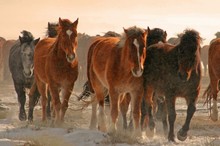The U.S. Forest has informed the Salt River Wild Horse Management Group (SRWHMG) that it intends to withdraw its July 31, 2015, notice to round up and impound the wild horses that roam the Tonto National Forest along the Salt River.

A happier holiday for Salt River horses and their advocates
While much work remains to be done and many details to work out, this is a very positive step toward protecting the Salt River horses, who are clearly valued by the public.
© 2015 by Jana Wilson
The withdrawal comes within days of the expiration of the 120-day stay of the roundup that was negotiated by the SRWHMG shortly after the impound notice was published.
Since August, the SRWHMG, the local community and the American Wild Horse Preservation Campaign have worked toward the cancellation of the impound notice in order to allow time to negotiate an agreement for the long-term protection of the horses on Salt River.
Last Friday, the Arizona U.S. House delegation led by Congressman Matt Salmon, sent a letter to U.S. Secretary of Agriculture Tom Vilsack urging the Forest Service to move quickly to implement reasonable, humane solutions and protect the horses where they live. The letter encouraged the agency to work with the community and questioned why the horses could not be managed under the 1960 Multiple-Use Sustained-Yield Act.
SRWHMG president Simone Netherlands recently met with Neil Bosworth, the Tonto National Forest supervisor, and received assurances that the agency is committed to working toward a long-term plan for the humane management of the horses.
âThis is a big deal to us,â Netherlands said. âThat notice has been hanging like a cloud over our heads all this time. We are grateful for this important step and will continue to do everything in our power to work with the Forest Service and other authorities towards the good of the Tonto National Forest.â
âWhile much work remains to be done and many details to work out, this is a very positive step toward protecting these horses, who are clearly valued by the public,â said Suzanne Roy, director of the American Wild Horse Preservation Campaign. âItâs wonderful when our elected representatives and government agencies listen to the will of the people.â
The SRWHMG rallied the public and politicians immediately following the Forest Serviceâs announcement of its intent to round up the horses. The group also filed a federal lawsuit seeking an injunction to stop the Forest Service from rounding up the horses. The SRWHMG later dropped the lawsuit as a sign of good faith in an effort to continue negotiations with the Forest Service.
Arizonaâs political leaders, including Governor Doug Ducey, Senators John McCain and Jeff Flake, and Congresspersons Salmon, Trent Franks, Martha McSally, Ann Kirkpatrick, Raul Grijalva, Kyrsten Sinema, Ruben Gallego and David Schweikert, have expressed their strong support for their constituentsâ desire to establish long-term protection for the Salt River horses.
âThe freedom of these wild horse families means a great deal to the American people,â concluded Simone Netherlands. âPerhaps it is because they represent what we care about most - freedom and family.â
The Salt River Wild Horse Management Group (SRWHMG) is an Arizona non-profit organization established to protect, monitor and scientifically study the Salt River Wild Horses. The SRWHMG has been spearheading the effort to secure lasting protections for this iconic and beloved wild horse herd in the Tonto National Forest.
The group has documented the Salt River wild horses in the Tonto National Forest for almost 20 years and keeps meticulous records of birth rates and death rates, migrating patterns and herd dynamics, as well as environmental circumstances and hopes to come to humane management solutions with the Forest Service for the permanent preservation of the Salt River wild horses.
The American Wild Horse Preservation Campaign (AWHPC) is dedicated to defending Americaâs wild horses and burros to protect their freedom, preserve their habitat, and promote humane standards of treatment. AWHPCâs mission to preserve and protect wild horses and burros in viable free-roaming herds on public lands for generations to come is endorsed by a coalition of more than 60 horse advocacy, public interest, and conservation organizations.
